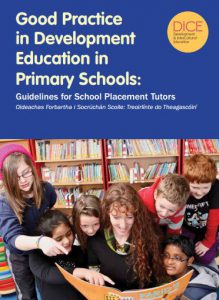The guidelines provide background information on the rationale for Development Education in the primary classroom, identifying the core concepts and most relevant links with the Primary School Curriculum. There is an emphasis throughout on the distinct features of development education, and the particular role it plays in helping young people to actively engage with local and global issues.
Suggestions are made regarding a range of active learning methodologies, with a stress on the importance of the action component of development education.
In the Appendix there is a useful summary of key issues to be applied to all integrated development education lessons taught in primary classrooms and checklists of reflective questions for School Placement Tutors and for student teachers.
Guidance and information on key terms, concepts and methodologies relating to development education is also included.
These guidelines will be of great interest to School placement tutors and to student teachers alike. The document serves as a concise introduction to good practice in Development Education in general which may be useful to a wider range of educators in this area.
For more
This document complements other guidelines that have previously been developed, such as IDEA’s Good Practice Guidelines for Development Education in Schools (2013) and provide specific input on linkages between development education and the Primary School Curriculum.

